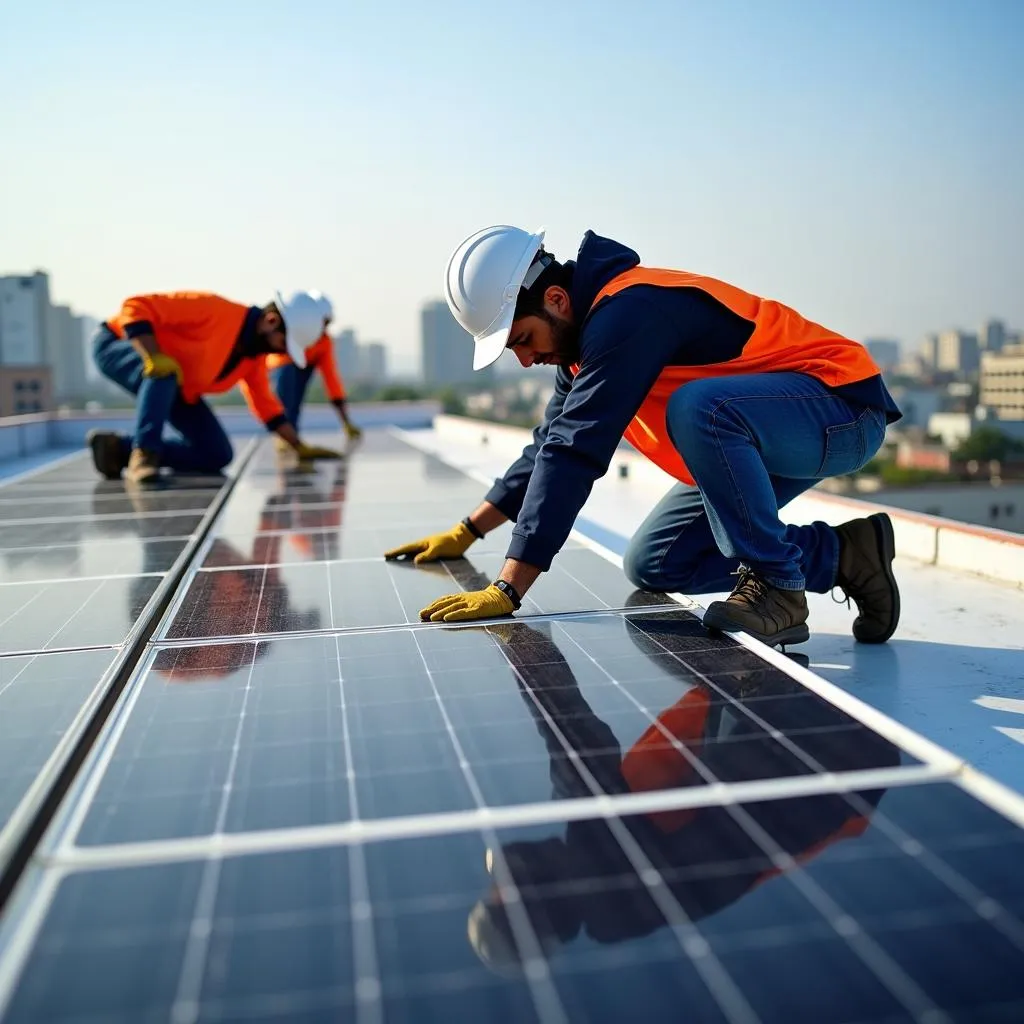Solar converter prices in Pakistan have been steadily declining in recent years, making solar energy an increasingly attractive option for homeowners and businesses alike. This guide will provide you with all the information you need to know about solar converter prices in Pakistan, including the factors that affect pricing, the different types of solar converters available, and tips on how to choose the right solar converter for your needs.
Understanding Solar Converters: The Heart of Your Solar Power System
Before we delve into the specifics of pricing, it’s crucial to understand what solar converters are and how they function. A solar converter, often referred to as a solar inverter, is an indispensable component of any solar power system. Its primary role is to convert the direct current (DC) electricity generated by solar panels into alternating current (AC) electricity, which is the standard used in homes and businesses.
Why is AC Conversion Necessary?
Solar panels produce DC electricity, which is suitable for powering certain devices directly. However, most household appliances and the power grid operate on AC electricity. The solar converter acts as a bridge, enabling you to utilize the clean energy harnessed by your solar panels to power your home or business and even feed excess energy back into the grid.
Factors Influencing Solar Converter Price in Pakistan
The price of solar converters in Pakistan can vary significantly based on several key factors:
-
Type of Inverter: Solar converters come in various types, including string inverters, microinverters, and hybrid inverters. Each type has its own set of advantages and disadvantages, which influence their price points.
-
Inverter Capacity: The capacity of a solar converter, measured in kilowatts (kW), directly impacts its price. Higher capacity inverters are essential for larger solar panel systems and naturally come at a higher cost.
-
Brand Reputation: Just like any other electronic device, brand reputation plays a role in determining the price of solar converters. Well-established brands often command a premium price due to their track record of reliability and performance.
-
Features and Functionality: Some solar converters offer advanced features such as built-in monitoring systems, Wi-Fi connectivity, and smart grid compatibility. These additional features can increase the overall cost.
-
Installation Costs: While not directly related to the inverter itself, installation costs are an essential consideration. The complexity of your solar power system and the location of your property can influence the installation fees.
 Solar Panel Installation in Pakistan
Solar Panel Installation in Pakistan
Exploring Different Types of Solar Converters
String Inverters: The Budget-Friendly Choice
String inverters are the most common and generally the most affordable type of solar converter. They work by combining the DC output of multiple solar panels connected in a series, forming a “string.” String inverters are a cost-effective option for homes with ample unshaded roof space.
Microinverters: Maximizing Energy Production
Microinverters, as their name suggests, are compact inverters attached to individual solar panels. This configuration allows each panel to operate independently, maximizing energy production even in partially shaded conditions. While microinverters offer enhanced efficiency, they typically come at a higher price point compared to string inverters.
Hybrid Inverters: Bridging the Gap Between Solar and Storage
Hybrid inverters represent the latest advancement in solar technology. They combine the functionality of a solar converter with a battery charger, allowing you to store excess solar energy in batteries for later use. Hybrid inverters are ideal for homeowners seeking energy independence and backup power during grid outages.
Choosing the Right Solar Converter for Your Needs
Selecting the appropriate solar converter is crucial for the efficiency and longevity of your solar power system. Here are some key factors to consider:
-
Size of Your Solar Panel System: The capacity of your solar converter should align with the total wattage of your solar panels.
-
Roof Orientation and Shading: For roofs with partial shading, microinverters or optimized string inverters are recommended to mitigate energy losses.
-
Budget Considerations: Determine your budget and explore the different inverter options that fit within your financial constraints.
-
Future Expansion Plans: If you anticipate expanding your solar power system in the future, choose an inverter with sufficient capacity to accommodate the additional panels.
 Different Types of Solar Converters
Different Types of Solar Converters
Conclusion: Embracing a Sustainable Future
Investing in a solar power system is a smart financial decision and a significant step towards a greener future. Understanding the factors influencing solar converter prices in Pakistan empowers you to make informed choices and reap the benefits of clean, renewable energy. By carefully considering your energy needs, budget, and long-term goals, you can select the ideal solar converter and embark on your journey towards energy independence.
FAQ
1. What is the average lifespan of a solar converter in Pakistan?
Most quality solar converters come with warranties of 5-10 years, and with proper maintenance, they can last for 15-20 years or even longer.
2. Can I install a solar converter myself?
Solar converter installation requires technical expertise and should always be performed by qualified professionals to ensure safety and optimal system performance.
3. Do I need a separate solar converter for my solar water heater?
No, solar water heaters typically use DC power and do not require a separate solar converter.
4. What are the signs of a failing solar converter?
Common signs of a failing solar converter include a significant drop in energy production, unusual noises from the inverter, or error messages displayed on the monitoring system.
5. Can I sell excess solar energy back to the grid in Pakistan?
Yes, Pakistan has a net metering policy that allows residential and commercial solar power system owners to sell excess electricity back to the grid.
For personalized assistance in choosing the right solar converter for your needs and getting a customized quote, please contact us at +923337849799, email us at news.pakit@gmail.com, or visit our office located at Dera Ghazi Khan Rd, Rakhni, Barkhan, Balochistan, Pakistan. Our team of solar energy experts is available 24/7 to answer your queries and guide you through the process.